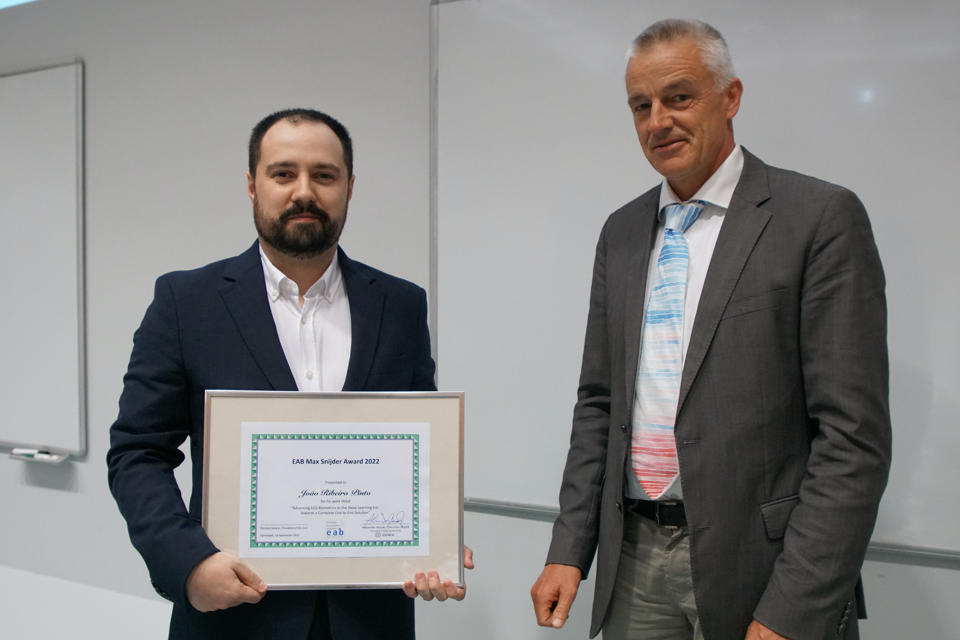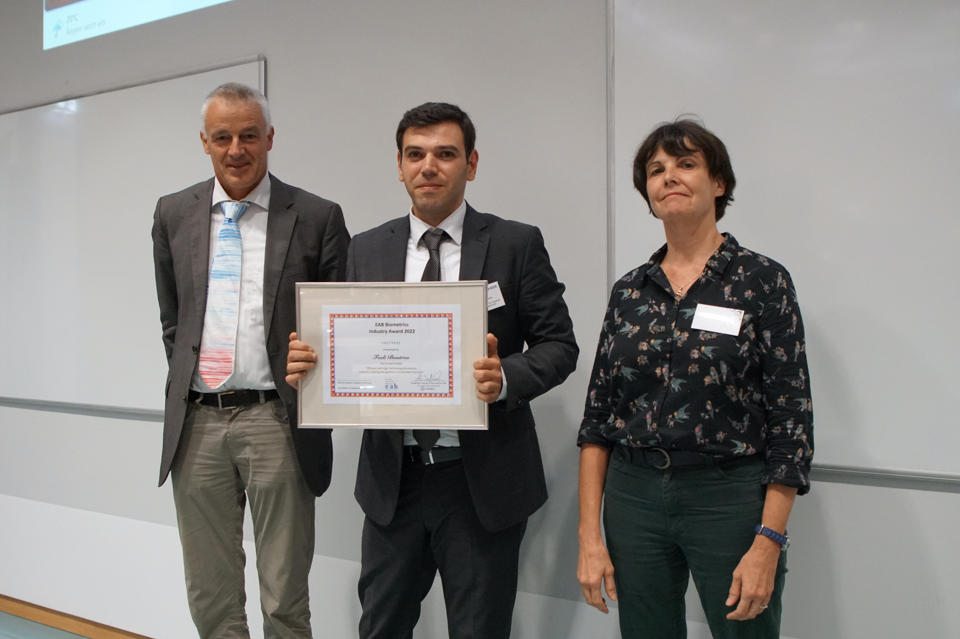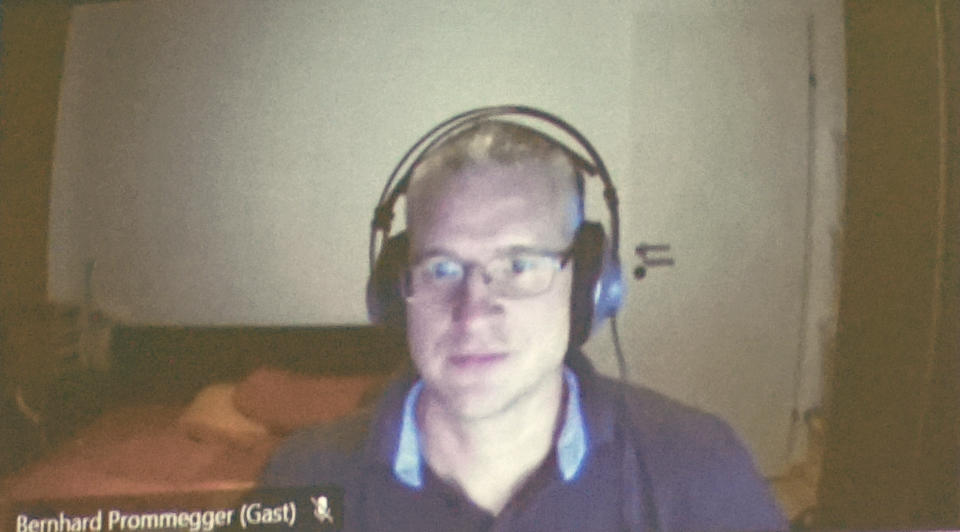2022 EAB Biometrics Awards
 The EAB award chair, Prof Patrizio Campisi (Università degli Studi Roma Tre), the award winners Bernhard Prommegger, Fadi Boutros, João Ribeiro Pinto and the jury members Josef Kittler, Raymond Veldhuis, Fernando Alonso, Javier Ortega and Christoph Busch together with Claude Bauzou.
The EAB award chair, Prof Patrizio Campisi (Università degli Studi Roma Tre), the award winners Bernhard Prommegger, Fadi Boutros, João Ribeiro Pinto and the jury members Josef Kittler, Raymond Veldhuis, Fernando Alonso, Javier Ortega and Christoph Busch together with Claude Bauzou.
Winners of the 16th European Biometrics Max Snijder, Research, and Industry Awards
Darmstadt, Germany, 2022-09-16
The European Association for Biometrics (EAB) awarded young researchers for their outstanding work in the area of biometrics on 14 September 2022. An international jury chose 3 candidates, out of a broad range of submitted high quality papers, to present their significant contribution in front of the jury, EAB members and public audience in a hybrid meeting.
European Biometrics Max Snijder Award
The winner of the European Biometrics Max Snijder Award is João Ribeiro Pinto from University of Porto (Portugal) for his PhD-thesis ”Seamless Multimodal Biometrics for Continuous Personalised Wellbeing Monitoring“. With his PhD work he addresses deep learning approaches for electrocardiogram (ECG) biometrics. This work presents pioneering work on truly end-to-end ECG biometrics, addressing the integration of traditional pipeline processes, integrated template security and interpretability. The results show that the proposed methodology is able to offer improved performance and robustness with challenging realistic data without overlooking biometric security. As such, it is a complete deep learning solution for ECG biometrics offering an accurate, robust, and promising foundation for real ECG biometrics applications, which has the potential to be transferred to other biometric modalities.
 F.l.t.r. João Ribeiro Pinto, Christoph Busch
F.l.t.r. João Ribeiro Pinto, Christoph Busch
European Biometrics Industry Award
This year the European Biometrics Industry Award goes to Fadi Boutros from Fraunhofer IGD (Germany) for his work “Efficient and High Performing Biometrics: Towards Enabling Recognition in Embedded Domains”. The work addresses three areas of research, efficient and high-performing face recognition, the emerging challenge of masked face recognition, and biometrics in head-mounted displays. There is increased interest in biometrics on low-end devices, e.g., face recognition will be integrated into 2.1 billion mobile devices by 2024. Designing efficient biometric solutions is a key enabler for mobile device applications, to securely verify the identity of the individual on the edge devices without sending sensitive biometric data to the server for biometric decision-making. Another prominent use case of computationally restrained biometrics is the automotive domain. The PhD-thesis proposed solutions aimed to require low computational cost and low memory footprint to enable wider deployment of biometrics in use-cases constrained by computational capabilities.
Moreover, targeting the emerging challenge of masked face recognition, this work presented a solution that mitigates the effects of wearing a mask and improves masked face recognition performance. This solution operates on top of existing face recognition models and thus avoids the high cost of retraining existing face recognition models.
Also the best presenter award was given to Fadi Boutros.
 F.l.t.r. Christoph Busch, Fadi Boutros, Claude Bauzou
F.l.t.r. Christoph Busch, Fadi Boutros, Claude Bauzou
European Biometrics Research Award
The European Biometrics Research Award 2022 was granted Bernhard Prommegger from University of Salzburg (Austria) for his work “Finger Rotation Estimation and Correction in Finger Vein Biometrics”. The work addresses one of the main problems in vein recognition, which is finger misalignment during acquisition, in particular longitudinal finger rotation. Typical capturing devices acquire a single image from a single finger during recognition. As the longitudinal rotation of the finger is neither known nor can it be estimated, it is difficult to apply countermeasures to improve recognition rates. This work evaluates the presence of longitudinal finger rotation and its extent in publicly available finger vein data sets. Furthermore, it proposes a classical and a Convolutional Neural Networks (CNN) based approach to detect the rotation between two finger vein samples and analyses the effect of rotation correction before the biometric comparison.
 Bernhard Prommegger
Bernhard Prommegger
The EAB awards have a total value of €4.000,00 which is divided amongst the winners. The finalists are also donated a free of charge one-year membership of EAB. The awards were kindly co-sponsored by IDEMIA.
The selection of the EAB awards has been made on the basis of the academic and scientific quality of the submitted works as well as on the quality of their presentations. A separate selection was made during the final presentation in order to appoint the winners of the Industry and Max Snijder Awards. Criteria for the Industry Award are next to the scientific level the novelty, impact, applicability and other business aspects. The Max Snijder Award is granted to a researcher, who expressed through his work a wider perspective to get a broader picture on biometric applications.
The EAB Biometrics Awards are granted annually to individuals who make a significant contribution to the field of biometrics research in Europe. The intention of the awards is to stimulate and promote innovation and research in the field of Identity and Biometrics in Europe.
The call for submissions for the European Biometrics Max Snijder, Research, and Industry Awards 2023 is available at eab.org/award





